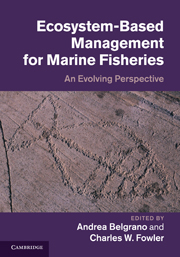Book contents
- Frontmatter
- Contents
- List of contributors
- Foreword
- Acknowledgments for cover artwork
- Introduction
- PART I CURRENT FORMS OF MANAGEMENT
- PART II ELEMENTS OF IMPORTANCE TO MANAGEMENT
- PART III USING PATTERNS
- 10 Science and management: systemically matching the questions
- 11 Sustainability, ecosystems, and fishery management
- 12 On the path to holistic management: ecosystem-based management in marine systems
- Afterword
- Index
- Plate section
11 - Sustainability, ecosystems, and fishery management
from PART III - USING PATTERNS
Published online by Cambridge University Press: 17 February 2011
- Frontmatter
- Contents
- List of contributors
- Foreword
- Acknowledgments for cover artwork
- Introduction
- PART I CURRENT FORMS OF MANAGEMENT
- PART II ELEMENTS OF IMPORTANCE TO MANAGEMENT
- PART III USING PATTERNS
- 10 Science and management: systemically matching the questions
- 11 Sustainability, ecosystems, and fishery management
- 12 On the path to holistic management: ecosystem-based management in marine systems
- Afterword
- Index
- Plate section
Summary
Abstract
Fisheries management is experiencing a trend in which harvest rates are being reduced as more of the principles of management are implemented, as more information emerges, and as more of the complexity of natural systems is taken into account. As recently as the late 1960s, there was overt and widespread acceptance of fishing mortality rates that were equivalent to natural mortality rates (F = M) – an outdated standard that is still occasionally implemented today. From this extreme, reductions in fishing mortality rates of target resource species have been based on a variety of arguments, not the least of which is consideration of other species (especially endangered species) and ecosystems. What are sustainable harvest rates if we implement management principles completely and fully account for complexity? If we project current trends into the future, how much would we reduce current harvest rates to embody full sustainability?
This chapter presents examples of the choice and use of empirical information for estimating harvest rates for fisheries so as to abide by established principles of management. We present measures of empirically observed rates of predation/consumption by various marine mammals as standards and reference points for fisheries management. These measures include recognized statistical parameters as well as maximized biodiversity. Such empirical standards are emergent from complexity and, through this emergence, fully account for the complexity behind their origin.
- Type
- Chapter
- Information
- Ecosystem Based Management for Marine FisheriesAn Evolving Perspective, pp. 307 - 336Publisher: Cambridge University PressPrint publication year: 2011
- 1
- Cited by



